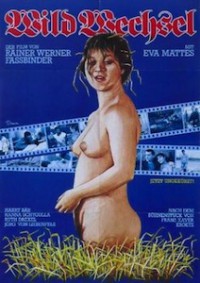
40 years ago: RWFs BREMEN FREEDOM and JAILBAIT
 Poisonings and an ugly scandal in late 1972
Poisonings and an ugly scandal in late 1972
On December 27, 1972, BREMEN FREEDOM was shown for the first time on German television and, from December 30, 1972 onwards, JAILBAIT caused a stir across the Federal Republic. Both films deal with the attempt by characters to free themselves from the restrictiveness of dominant social conventions and anomalies by means of murder. Both films are also directly based on theater plays.
BREMEN FREEDOM is a television production that includes theatrical elements developed by Rainer Werner Fassbinder with Bremen’s Schauspielhaus ensemble. It was at the Schauspielhaus that RWF first directed the play in 1971, with a cast that included Margit Carstensen, Wolfgang Schenck, Kurt Raab and Fritz Schediwy. In the film version Margit Carstensen again plays Geesche Gottfried, a character based on a real case from the nineteenth century, who murders fifteen people by arson, including her mother, husbands and children, as well as a number of people in her immediate social circle. “It is the motif of murder, rather than the way it is solved, that is interesting in this play. Geesche Gottfried kills because she wants to be free, because she does not want to be her men’s ‘pet.’”
The television play was commissioned by the broadcaster Saarländischer Rundfunk (SR) and produced in 1972 by Telefilm Saar over nine days in a Saarbrücken studio at a cost of 240,000 DM. It premiered on the southwest German TV channels SR, SWR and SDR.
Only a few days later, on December 30, The Royal-Palast cinema in Munich previewed Fassbinder’s JAILBAIT, a film that was to cause a scandal throughout the country. The script is based on a play by Franz Xaver Kroetz, which draws on a real-life case that took place in the 1960s. However, Kroetz violently disagreed with Fassbinder’s adaptation, calling it “Pornography with a social-critical touch.”
In the film, the 13-year-old Hanni (Eva Mattes) and the 19-year-old Franz (Harry Baer) begin a sexual relationship. Their romance is opposed by Hanni’s parents, above all by her father. Franz is sent to prison for having sex with a minor. However, after his release he resumes his relationship with Hanni, who becomes pregnant. Hanni persuades Franz to shoot her father because he is standing in the way of their love.
In the controversy that erupted Kroetz and Fassbinder both took strong stands. In an interview Kroetz said, “What I find obscene is the way the film denounces the characters. The girl is not some nymphomanic tart but merely someone who tries to escape the catholic parochialism of her family and in the process has a wonderful experience of love. And the boy is not a sex-driven idiot but someone who needs love.” (Abendzeitung München, March 8, 1973)
Fassbinder responded with an open letter: “What is it, honestly, that embarrasses you? […] Everything that is in the film is also in the play. Maybe that embarrasses you. But it shouldn’t. Your play really isn’t that bad.” (Abendzeitung München, March 3, 1973; reprinted in Rainer Werner Fassbinder: Filme befreien den Kopf. Frankfurt am Main: Fischer Taschenbuch Verlag 1984, 123-124)
The film was commissioned by the Senders Freies Berlin (SFB) and produced by Intertel Television. It was shot over 14 days in March 1972 in the Lower Bavarian town of Straubing and its surroundings. Production costs came to 550,000 DM. The German film industry’s rating organization (FSK) gave the film an “above 18” rating due to its nude scenes. The uncut version was first broadcast on German television by SFB on January 9, 1973. The German Film Evaluation Commission (FBW) subsequently certified as “especially valuable” the version approved by the FSK for cinematic release. The film officially opened on March 8, 1973 in Munich’s Luitpold-Theater.
More information:
RWFF filmography on BREMEN FREEDOM
RWFF filmography on JAIL BAIT